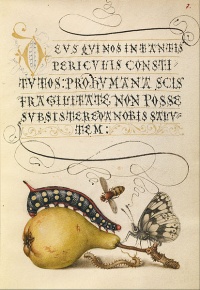Fruit
From The Art and Popular Culture Encyclopedia
| Revision as of 15:38, 5 February 2008 Jahsonic (Talk | contribs) ← Previous diff |
Revision as of 07:58, 15 February 2015 Jahsonic (Talk | contribs) Next diff → |
||
| Line 1: | Line 1: | ||
| + | [[Image:Fly, Caterpillar, Pear, and Centipede is the informal title for one page from the Mira Calligraphiae Monumenta by Joris Hoefnagel..jpg|thumb|right|200px|A pear in ''[[Fly, Caterpillar, Pear, and Centipede]]'' from the ''[[Mira Calligraphiae Monumenta]]'' by [[Joris Hoefnagel]].]] | ||
| {{Template}} | {{Template}} | ||
| - | == See also == | + | In [[botany]], a '''fruit''' is a part of a [[angiosperms|flowering plant]] that derives from specific [[Tissue (biology)|tissues]] of the [[flower]], one or more [[Ovary (plants)|ovaries]], and in some cases accessory tissues. Fruits are the means by which these plants disseminate seeds. Many of them that bear edible fruits, in particular, have propagated with the movements of [[homo sapiens|humans]] and animals in a [[Symbiosis|symbiotic relationship]] as a means for [[seed dispersal]] and [[nutrition]], respectively; in fact, humans and many animals have become dependent on fruits as a source of food. Fruits account for a substantial fraction of the world's [[agriculture|agricultural]] output, and some (such as the apple and the [[pomegranate]]) have acquired extensive cultural and symbolic meanings. |
| + | |||
| + | The section of a [[fungus]] that produces [[spore]]s is also called a fruiting body. In common language usage, "fruit" normally means the fleshy seed-associated structures of a plant that are sweet and edible in the raw state, such as [[apple]]s, [[Orange (fruit)|orange]]s, [[grape]]s, [[garden strawberry|strawberries]], and [[banana]]s. On the other hand, the botanical sense of "fruit" includes many structures that are not commonly called "fruits", such as [[bean]] pods, [[maize|corn]] [[Seed|kernels]], [[wheat]] grains, and [[tomato]]es. | ||
| + | |||
| + | ==See also== | ||
| + | * [[Fruit tree]] | ||
| + | * [[Fruitarianism]] | ||
| + | * [[List of culinary fruits]] | ||
| + | * [[Paintings of fruit]] | ||
| *[[Forbidden fruit]] | *[[Forbidden fruit]] | ||
| - | [[Category:Non-mainstream]] | ||
| {{GFDL}} | {{GFDL}} | ||
Revision as of 07:58, 15 February 2015

|
Related e |
|
Featured: |
In botany, a fruit is a part of a flowering plant that derives from specific tissues of the flower, one or more ovaries, and in some cases accessory tissues. Fruits are the means by which these plants disseminate seeds. Many of them that bear edible fruits, in particular, have propagated with the movements of humans and animals in a symbiotic relationship as a means for seed dispersal and nutrition, respectively; in fact, humans and many animals have become dependent on fruits as a source of food. Fruits account for a substantial fraction of the world's agricultural output, and some (such as the apple and the pomegranate) have acquired extensive cultural and symbolic meanings.
The section of a fungus that produces spores is also called a fruiting body. In common language usage, "fruit" normally means the fleshy seed-associated structures of a plant that are sweet and edible in the raw state, such as apples, oranges, grapes, strawberries, and bananas. On the other hand, the botanical sense of "fruit" includes many structures that are not commonly called "fruits", such as bean pods, corn kernels, wheat grains, and tomatoes.
See also

